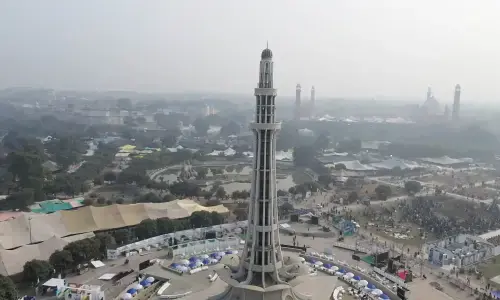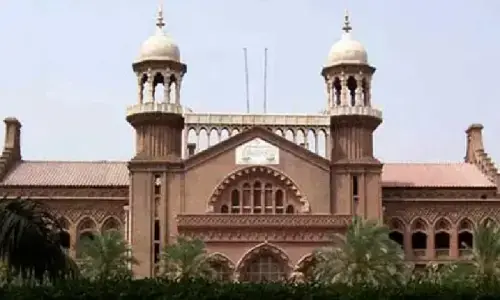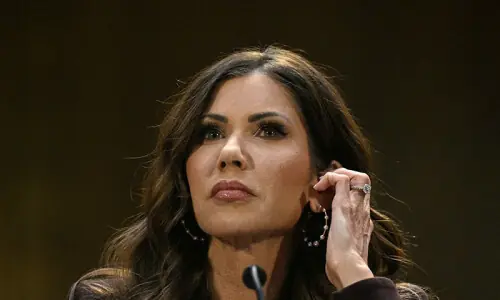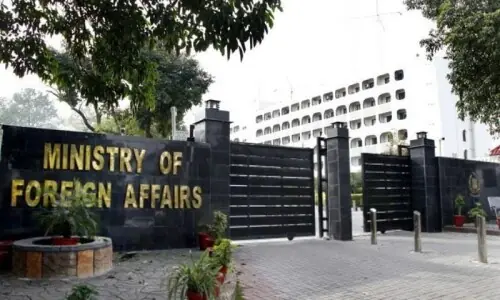THE Formanite Alumni Association of the Forman Christian College organised its 11th annual reunion since denationalisation and dedicated it to FCC’s 150th anniversary celebrations this past week.
The sesquicentennial celebrations had begun with Alumni Sports on Feb 22 and are concluding with Founder’s Day event on Monday (today).
At the reunion, Distinguished Formanite Awards for outstanding contributions in their fields were given to Justice Wajihuddin, Lt Gen Farooq Ahmad Khan and Gen Noel Israel Khokhar. Gen Kuldeep Singh Bajwa, a Formanite from India and president of the Chandigarh chapter of the Alumni Association, was also honoured.
A special award was given to Chaudhry Ahmad Saeed in recognition of his role in reviving the Formanite Alumni Association and raising funds for the university through his own contributions as well as requests to others.
Chief Justice of Pakistan Tassaduq Hussain Jillani, who is also a Formanite, delivered a detailed speech at the event remembering his days in college beginning with his admission and highlighting the modern-day challenges. He advised the graduates to take on the challenges and play their part in making this world a livable place.
Justice Jillani said this “brave new world” is not the same as was in the days of our forefathers. Now, he said, people were living in an age of advanced technology, an age of internet, nanotechnologies, genomics and shrunken distances.
Describing social media as the greatest tool to empower the masses in a democracy, he said, social media was having a universal transformative effect as almost two billion of the world’s seven billion population had come online and was increasing.
Stating that dividing lines between the international and domestic relations were thinning out, Justice Jillani said the people were also becoming more vulnerable to weapons of mass destruction and to terrorist acts of non-state actors.
At the domestic level, those non-state ‘merchants of death’ had wreaked violence in the name of sect, ethnicity and a narrow worldview. “This is the kind of the world the young graduates will be required to confront and they will have to surmount the societal issues and challenges while leading their practical lives,” he warned.
Stating that the youth’s lives would be defined by how they would respond to the challenges, Justice Jillani said the process of social renewal and reforms was in progress and the youth needed to stand up and speak that was morally right. Otherwise, he said, the space would be filled and painted by others according to their version of what was right and wrong, of truth and falsehood, of belief and disbelief.
Acknowledging that the youth would be having their own diversified careers and kinds of life, the chief justice of Pakistan said still all hold one common office in a democracy i.e., the office of a citizen that required all to remain concerned to public affairs at home and abroad besides stakes in peace, amity and progress the world around.
FCC Rector Dr James Tebbe summarised the college’s achievements during the past year and discussed future plans for the university, including developing the liberal arts programmes for students, developing a South Asia Institute for Research and Policy Development, leadership development for faculty and administrative staff, and developing teacher education programmes.
He lauded the federal and provincial governments as well as USAID for their support towards infrastructural development and providing scholarships.
Balochistan Governor Muhammad Khan Achakzai, US Consul General in Lahore Nina Fite, FCC Board of Directors member Yusuf Shirazi and former rector Dr Peter Armacost were present.
The evening ended with rock band ‘Noori’ performing to some of its popular numbers.
THE Higher Education Commission, Regional Centre Lahore, last week organised bilingual Punjab Regional Declamation Contest as part of the All-Pakistan Inter-University Declamation Contest for the award of the 16th Allama Iqbal Shield at the Lahore College for Women University.
The declamation contest, HEC Director General (Academics) Fida Hussain said, provided the youth with a forum to hold dialogue, convince each other and develop a sense of tolerance and responsibility.
As many as 103 orators from 28 public and private universities in Punjab delivered fiery speeches on five different subjects separately chosen for English and Urdu contests.
In Urdu declamation contest, University of Sargodha’s Izwar Abbas won the first position, while King Edward Medical University’s Haris Bilal and Government College University, Lahore’s Zahid Ali bagged second and third positions, respectively.
In English declamation contest, University of Gujrat’s Safia Zia, Fatima Jinnah Women University, Rawalpindi’s Naima Shahab and Punjab University’s Moazam Khan Lodhi earned the top three positions.
HEC DG Fida Hussain said the winners would participate in the national level debating contest in Islamabad during March.
HEC Regional Director Dr Nazir Hussain discussed the Commission’s reforms, outcomes and achievements in the area of research publications, number of PhDs produced and industry-academia linkages during the past one decade.
LCWU Vice-Chancellor Dr Sabiha Mansoor said the last ten years were a golden decade for higher education in Pakistan. Stating that confidence was very important for the development of the youth, she added the university was specially focusing on developing students’ confidence.
Punjab Education Minister Rana Mashhood Ahmad Khan reiterated the Punjab government’s endeavours in education sector.
PRESS Council of Pakistan chairman Shafqat Khan Abbasi has said the print media in Pakistan is following the code of ethics better than the electronic media which is involved in the ugly race of ratings.
He said the code of ethics also needed to be followed for advertisements that generated revenue for the media outlets.
Mr Abbasi was speaking at “A dialogue towards promoting ethical media in Pakistan,” organised by the Lahore College for Women University’s Mass Communication Department in collaboration with the Press Council of Pakistan.
He regretted that the electronic media aired incorrect news to gain ratings.
The Press Council chairman said the Pakistani media was better in terms of observing code of ethics compared to India and other South Asian countries. He said Pakistani journalists had given sacrifices for the freedom of expression.
Prof Dr Sabiha Mansoor stressed that such debates must continuously be organised in universities to inform the students about market trends and their ethical responsibilities.
Geo TV’s Abdul Rauf said the media was related to culture and acting in terms of pluralism. He said journalists also faced pressures while even giving authentic news items.
The News on Sunday Editor Farah Zia and LCWU Mass Communication Department acting chairperson Faiza Latif also talked about the ethics subject. — mansoormalik173@hotmail.com

































